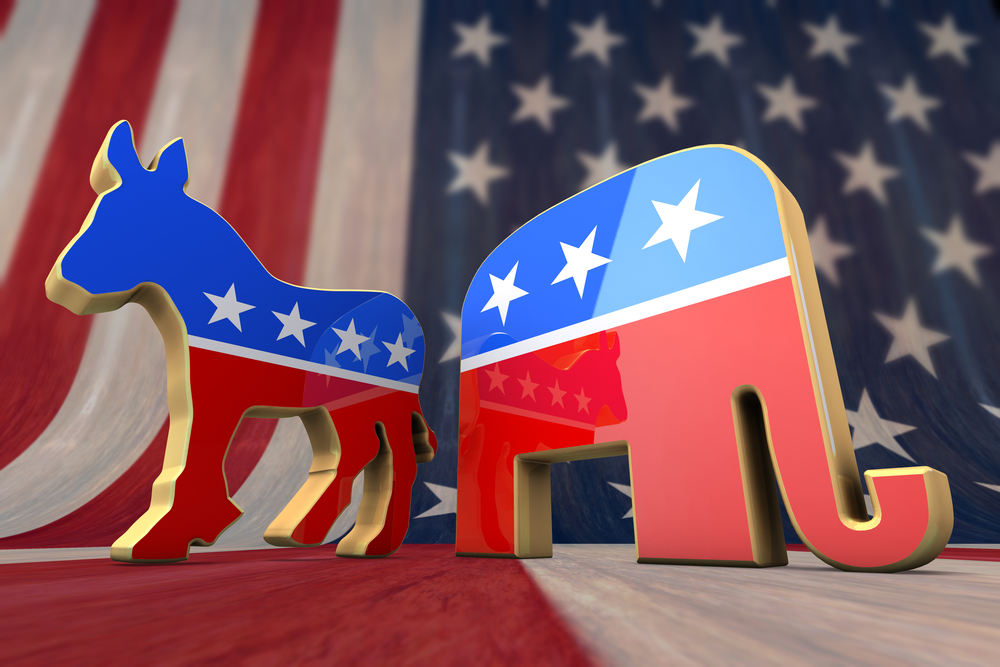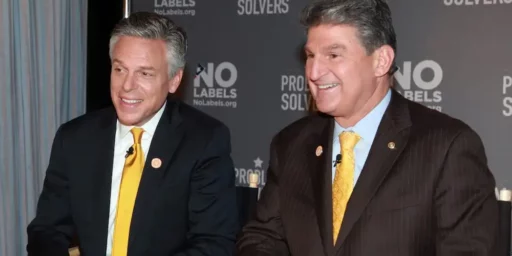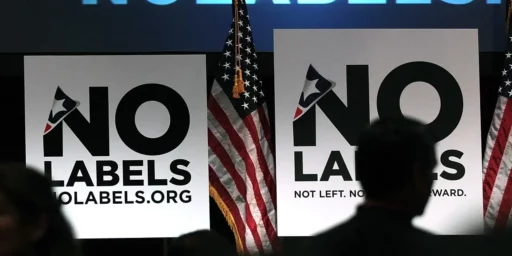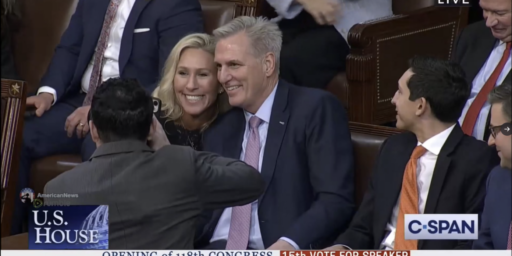A Key Role of Parties
Top Four likely makes things worse.

James Joyner’s post on Alaska’s Top Four system (which is not a primary, but a specific kind of two-round system–and I write that not at James specifically, but the wide universe of people who keep calling it a primary) has inspired a host of possible posts in my mind to the degree that I am not sure where to start (and that I don’t have time at the moment to write). It is less James’ specific post, but the topic in general (and some of the comments that are representative of broader discussions on these topics) that has my neurons firing at the moment.
Let me focus here on the role of parties.
A very important role played by parties in a representative democracy is serving as a signaling device to voters about candidates. The quality of that signaling device depends on a variety of factors, but one could imagine a theoretical spectrum from Lockstep (wherein every candidate for a given party actually adheres to a central set of policy goals in an unwavering fashion) to Free Agent (wherein each candidate can do whatever they want and suffer no consequences from the party). Put another way, does a system promote a personal vote or a party vote?*
Put another way: to what degree is a party label a meaningful signal of clear policy and ideological perspectives on a candidate-by-candidate, election-by-election basis, or to what degree are candidates able to shape do as they please in acquiring and running for office under a given label? And, further, how does that behavior translate into party discipline in office? And note that it is a continuous spectrum, not a pure dichotomy.
Moreover, how do parties shape their messages? Are they top-down or bottom-up? How well coordinated are parties and so forth?
All of this revolves around who controls the party’s label (i.e., who gets to use it and under what conditions) and how strict that control is (what do I, as a politician under Label X, have to do to lose the label)? The broader party system is one of competing labels and the rules of competition dictate the value of a given label. Clearly, in a strict two-party system, access to those two labels is huge (indeed, it is vital to participate in the system) while in a multi-party system a given label may not be as significant (and new ones do not guarantee loss).
Side note: the reason I frequently go a bit nuts on the “but there are a lot of independents!” observation that is frequently made in our political discourse (and again, this is not aimed at James, but on the overall observation) is that when push-comes-to-shove at the ballot box, those folks overwhelmingly go R or D because those are the only labels that truly matter in our system. As long as that is true, the way we gatekeep access to those labels matters and matters a lot.
At any rate, the R and D labels are vital to winning office in the US (and, indeed, while there are exceptions to this, those exceptions are so rare that they prove the rule). But, as I often note, no one really controls the labels. They are freely accessible to anyone who can win a primary. And in places that use Top Two and now Top Four, they are free for the taking (or, a small fee for the taking).
Another side note: I know a lot of readers are scoffing at the idea that our parties are weak because they are so significant. But we wouldn’t be talking about the power of Trump’s endorsements in primaries, or talking about how poorly his candidates did in key Georgia races if the GOP had strong, centralized control of its label. Indeed, as I frequently note, Trump would almost certainly not have been the nominee in 2016 if the party-as-organization had any power. He was considered an outsider joke at the time.
Shifting back to Top Four (or, for that matter Top Two), we see the weakness of the parties in action: there were over a dozen Republicans on the June 11th special election ballot in Alaska. In such a context, party label loses its ability to be a useful signaling device. So, what takes its place?
In no particular order: name recognition, money, and the national political environment.
If name recognition is more important than party label, that is a clear indication of the weakness of parties, and Top X systems cultivate and, indeed, exacerbate that weakness.
In a pool of over forty candidates (or even in a list of four), candidates need a way to distinguish themselves. One way to do so is to control party labels in a way that makes them meaningful. If there was only one Republican out of 40+ candidates, that would be a real signal, especially if voters knew that the Republican Party only gave its endorsement to candidates who would actually follow the party’s platform.
I would also note that while I understand the logic that Top X is supposed to blunt the power of extremes in the parties, the reality remains that first and foremost, the make-up of the district is relevant to what kind of ideological outcome the race is likely to produce. But, also, the national environment is key. If the national environment is more extreme, then that can affect local partisans looking for signals to differentiate among multiple co-partisans. In other words, maybe Rep X is the moderate one, but Rep Y has name recognition and is endorsed by national leaders, or the right-wing press. That may blunt whatever moderating effect the rules are supposed to bring. Again: people don’t do a ton of research, or even understand it if they do, about candidates and policies, but they do pay attention to signals. Let’s not forget that Top Two and Top Four exist in a broader, nationalized party environment.
A major problem in American politics is that we have strong partisanship and weak parties. It is part of what has allowed Trumpism to steer the GOP in the direction that it has. And it could likewise allow more left-leaning populists to affect the Democratic Party. I note this not because I want to make some kind of “both sides” argument, but to simply note that the structural pathways exist. (It isn’t even that hard to see, given that Bernie was a left-leaning populist).
The major problem with strong partisanship and weak parties is that national politics can turn into a less stable direction if one (or both) of the parties take a problematic turn because most of its voters will follow (and there is no centralized corrective). The general weakness of our parties allowed Donald Trump to become a massive player in national politics, and a lot of voters went with him. And because voters went with him, other politicians did as well, because they want to win.** It becomes a bit of a perpetual motion machine–and it is a cycle that doesn’t break until the party in question starts to lose and the losses are seen by the participants to be the result of problematic leadership and the direction it took the party.
Yes, we can all say (as I am sure someone has already said in the comments or at least thought it) that is is the fault of Republican voters for not rejecting this stuff. All well and good, and not necessarily wrong, per se. But I think everyone needs to ask themselves, in the quiet contemplation of their own minds: how bad would a Democratic populist have to be for you to vote Republican? Moreover, how bad would the Democrat have to be if there was a legitimate chance that voting for a crazy Dem of questions morality and ideology would guarantee policies that you want? Policies, indeed, that you think are morally vital? (Because that is the way a lot of GOPers see this stuff and have rationalized Trump away).
Regardless of all of that, again, party label is a major signaling device and one used by millions of people as the guide for making political choices. While stronger parties wouldn’t solve all of our problems,*** I do think that further weakening them by things like Top Four won’t improve much of anything and may well exacerbate the problems we already see in American politics (again: more focus on things like celebrity and an increased reliance on money). I would also underscore that when personality and style can be more important than party identity and policies, then populistic politicians have a greater opening.
*A great treatment on this topic can be found in Carey, John M., and Matthew Søberg Shugart. 1995. “Incentives to Cultivate a Personal Vote: A Rank Ordering of Electoral Formulas.” Electoral Studies 14,4: 417-439.
**It is a cliché of NFL analysis that it is a “copycat league” i.e., if something works for a winning team, such as a given offensive scheme, other teams try to copy it. Politics is very much like that.
***I do think that if we had stronger parties that it would lead to more parties being created because new political movements wouldn’t be able to use primaries to capture existing labels. I think think that more parties would create better representation and competition over the long haul. I also think that there is value in clarity of what parties represent.






A good discussion of a complex question. Especially in the light of one of the articles of faith about jungle-type primaries is the belief that continuing defeats that don’t even allow real ballot access would moderate who the Republicans (in the case of Washington State where I live) would select as candidates. So far, the candidates are still choosing themselves, though. And down in Southwest Washington, we have some doozies. 🙁
That last part is key. Because in at least two states the Republican Party has become more extreme despite that extremism causing them to be an irrelevancy. Rather than “ the losses are seen by the participants to be the result of problematic leadership and the direction it took the party” the people who remain invested in the party are fanatically adamant that the losses are because they didn’t go far enough.
I think we are too concerned about whether this system or that system results in more or fewer parties. We should be more concerned about what type of candidates come to the forefront. It is not as if in California or Chicago, which are almost exclusively Dem, there aren’t candidates representing different factions, different solutions, different capabilities. It is more important that a system results in good quality candidates winning then if there is one party or two or twenty.
So how do we strengthen parties? I serve as a precinct committee person and see how the sausage is made to some degree. In my view, the Democratic party in Oregon is governed by urban progressives are tone-deaf and motivate voters to consider independent “common sense” candidates, thus splitting the Democratic vote.
@MarkedMan:
And the main way you do that is via a more competitive environment. And more parties would enhance that possibility.